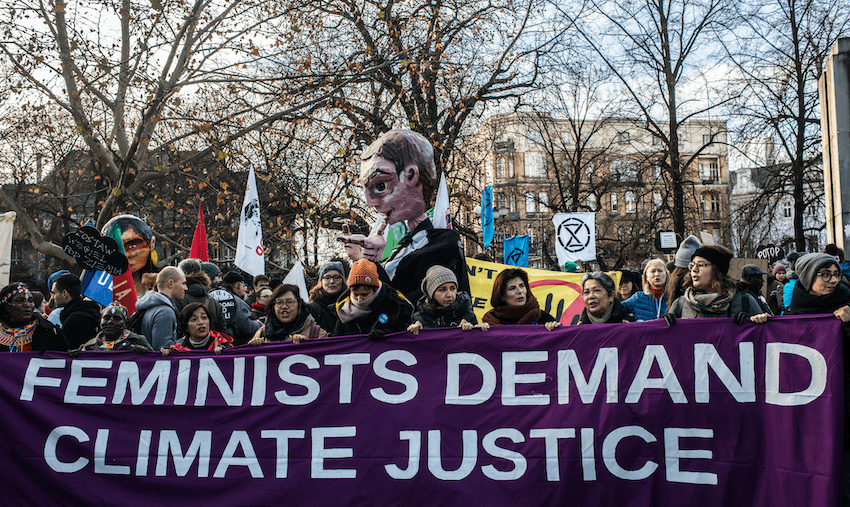Climate change will affect us all, but it already affects women and other marginalised genders differently.
The United States is in the midst of a battle over reproductive freedom. Seizing on the conservative political fervour of the moment, politicians are attempting to strip back women’s rights to abortion, contraception and other reproductive health care. Women’s bodies are the site of a battle for power and control, as they have been throughout history, and the US isn’t the only place where women’s rights over their bodies are being threatened. In many parts of the world women still have no access at all to abortion and other reproductive care. Watching this unfold in the US has been a reminder that our rights, even once achieved, are not set in stone. As a future of climate change looms, the risks to our bodily autonomy are amplified.
Young women are leading the charge for climate action around the world. Don’t get me wrong, men are standing up for action on climate too. But having been involved in the climate movement for over a decade, I feel confident that women are shining the light on our path out of climate darkness. In fact, research confirms more women than men are involved in the climate movement. Women (particularly indigenous women and women of colour) have been doing the grunt work in the climate movement for years, and it has been amazing to see young women step into their power and take charge in the youth climate strike movement.
For these young women, the future is uncertain on many levels. Climate change will affect us all, but it already affects women and other marginalised genders differently. It is already happening.
Even without repressive policy changes, the effects of climate change hit women disproportionately. Women make up most the world’s poorest people, making them more vulnerable to climate change-related disasters. Women still do the majority of care work for children and family members around the world. Childbearing and discriminate policies make them more vulnerable to disasters. Because of existing inequalities, natural disasters kill more women than men worldwide.
Recently climate campaigners have been arguing, with some success, for governments to declare climate change an emergency. I support this demand. Climate change is an emergency like no other. Every time I hear this call I am reminded of what happens to women and marginalised people in times of emergency and natural disasters. Violence against women increases in times of national emergencies and disasters. History has shown us that during these times those in power are most likely to strip back existing freedoms and rights. We must remember this reality and include reproductive rights and bodily autonomy in our demands for climate change to be treated as the emergency it is.
The Zika virus, a mosquito-borne illness closely related to dengue, hit the world hard in 2015 and 2016. Research suggests that this virus’s wide spread was a result of climate change. The effects were disproportionately felt by poor women, as congenital defects in babies of women infected by the virus affected thousands. Thousands of women were left to raise sick children, often alone. Latin America was hit the hardest by Zika. In an area with incredibly restrictive and punitive abortion laws, women were then told not to get pregnant by their governments. Laws were even proposed during this time in places such as Brazil that would result in even tougher sentences for women who sought abortion.
Climate change will mean that viruses like Zika are a year-round problem for many parts of the world, and New Zealand will not be immune. Women will feel the effects of viruses like Zika disproportionately not only through extra care of the sick, but economically due to being unable to work due to caring for the sick. Further, as Zika has proven, health emergencies are easily taken up as an excuse to tell women what to do with their bodies. Some have argued that Zika could lead to a ‘lost generation of women’. History has shown how the silencing of women in such circumstances is the norm, rather than the exception.
As we engage in the fight of our lives for climate action, we need to link that battle to demands for reproductive rights and bodily autonomy. That means bodily autonomy for everyone. The environmental movement has a poor track record on supporting the rights of trans people, and some strands of ‘deep ecology’ environmentalism are explicitly transmisogynist, denying the existence of the vast and wonderful array of gender identities that make up our species. We all need and deserve the right to control and define our own bodies.
In Aotearoa, we have a chance to make progress for rights to reproductive care this year as the government has promised to introduce a bill to remove abortion from the Crimes Act. As we see how these rights are being attacked elsewhere in the world and acknowledge the risks that climate change will pose to those rights, it is more important than ever to demand this law change here at home. That’s not enough though. We need to acknowledge that empowering women and other marginalised genders to tear down every last gendered inequality in our society will be vital as we negotiate a climate-changed world.
All struggles for bodily autonomy are linked. Let’s fight for a future where we can not only survive, but where we have networks of solidarity that create the resiliency we need against the coming storms.
